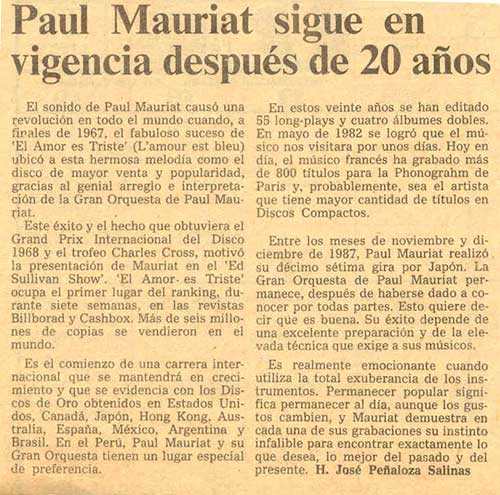Newspaper Clippings
Paul Mauriat Visit to Lima - 1981
- Paul Mauriat in Lima - 1981

Material kindly provided by
José Peñaloza
Translation:
Paul Mauriat
still of relevance after twenty years
The sound of Paul Mauriat bring
about a revolution all over the world when by the end of 1967,
the fabulous success of "Love is Blue" (L'amour est bleu) placed
this beautiful melody a the record of biggest sales and
popularity, thanks to the genius arrangement and performance of
the Great Orchestra of Paul Mauriat.
This success and the fact that he got the Grand Prix
International of the Record 1968 and the Charles Cross trophy,
motivated the appearance of Mauriat at the 'Ed Sullivan Show'.
'Love is Blue' was at the top of the charts for seven weeks in a
row, in the magazines Billboard and Cashbox. More than six
million copies were sold all over the world.
It was the beginning of an international career that would hold
on the rise and it was evidenced with the Golden Records in
United States, Canada, Japan, Hong Kong, Australia, Spain,
Mexico, Argentina and Brazil. In Peru, Paul Mauriat and his
Great Orchestra has a special place in the preferences.
In these twenty years it has been edited 55 LPs and four double
albums. In May of 1982 the musician visited us for a few days.
These days, the French musician has recorded more than 800
titles for the Phonogram of Paris, and probably is the artist
that has the largest collection of titles in CDs.
Between the months of November and December of 1987, Paul
Mauriat made his tenth tour to Japan. The Great Orchestra of
Paul Mauriat stands, after being well-known everywhere. That
means that it was good. Their success depends on the excellent
preparation and of the high
technique demanded on the
musicians.
It is really exciting when
he uses the full exuberance of the instruments. Being popular
means to stay updated, even though the tastes change and Mauriat
shows in each one of his recordings his infallible instinct to
find exactly what he wants, the best of the past and of the
present.
H. Jose Penaloza Salinas
Notes from the Translator:
It seems that José misplaces the dates on the visit of Mauriat to Peru, saying May 1982, when he was supposed to visit with his full orchestra, which never happened. Instead of the brief two-day visit he made in 1981.